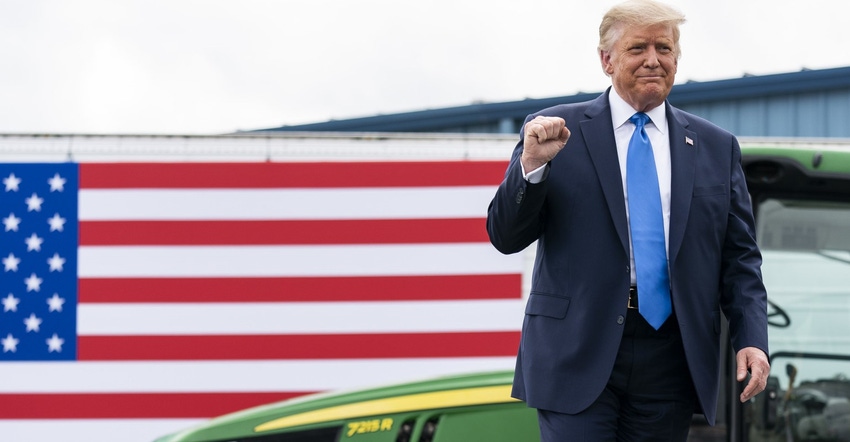Signup for CFAP will begin Sept. 21 and run through Dec. 11 for $14 billion in aid.

Updated Friday morning with additional details from USDA. See full story: USDA confirms $14b in CFAP2 aid for farmers.
During a campaign rally speech in Wisconsin Thursday night, President Donald Trump promised another $13 billion in relief for farmers as a result of coronavirus market impact. The U.S. Department of Agriculture offered additional details Friday morning of the anticipated Coronavirus Food Assistance Program (CFAP) tranche two payments and noted that it would comprise $14 billion in relief for three categories of commodities: price trigger commodities, flat-rate crops and sales commodities.
“My Administration is committing an additional -- you've been asking for this for a long time -- $13 billion in relief to help farmers recover from the China virus, including Wisconsin's incredible dairy, cranberry and ginseng farmers who got hurt badly,” Trump said.
“My agenda is 'Made in the USA,' so we did many things -- not only China, not only the $28 billion to farmers. We did so much, and I'm proud to announce that I'm doing even more to support Wisconsin farmers starting next week,” he added.
CFAP has already distributed one round of direct payments to agricultural producers whose markets have been disrupted or lost due to the coronavirus pandemic. As of Sept. 14, 601,672 applications had been approved for payments totaling $9.9 billion.
On Aug. 11, USDA announced approximately 60 additional commodities that would be eligible for assistance under CFAP. Congress authorized funding for CFAP in the Coronavirus Aid, Relief & Economic Security (CARES) Act, which was approved by a unanimous vote in the Senate. Trump signed the CARES Act into law on March 27. The CARES Act included $9.5 billion in funds to assist agricultural producers as well as additional resources to partially replenish the Commodity Credit Corp. (CCC). Additionally, Congress provided flexibility for Agriculture Secretary Sonny Perdue to purchase commodities for emergency distribution in the Families First Coronavirus Response Act.
“Once again, I thank President Trump and Secretary Perdue for their efforts to ensure American farmers, ranchers and growers can continue to feed the country and the world amidst depressed commodity prices and disrupted markets,” Senate Agriculture Committee chairman Pat Roberts (R., Kan.) said.
In a statement, National Farmers Union (NFU) president Rob Larew conveyed appreciation for the financial support and urged that it be distributed to those who need it most.
“Even as restrictions ease, it is evident that farmers will be feeling the effects of the pandemic for quite some time," Larew said. "Markets have been slow to recover, prices remain low and processing facilities are still backed up. While these challenges persist, farmers will certainly need assistance to stay solvent – and we are grateful that USDA is providing it through another round of CFAP."
Roberts took to the Senate floor with Republican members on Thursday afternoon to urge colleagues to replenish the CCC, which is used to implement the farm bill programs and to provide additional assistance to agricultural producers affected by the pandemic. Failure to replenish the CCC would jeopardize the continued implementation of 2018 farm bill programs and hurt already struggling farmers, ranchers and growers, Roberts said.
Meanwhile, Senate Agriculture Committee ranking member Sen. Debbie Stabenow (D., Mich.) has been critical of the way USDA has distributed trade mitigation payments and also was not supportive of replenishing the CCC without having more control over how the money is spent.
Larew noted in his statement that support is critical, but it is just as crucial that it is distributed fairly and equitably. “The first round of funding, though greatly appreciated, was not without its flaws; not only did it favor large farms over smaller ones, [but] it also sent millions of dollars to foreign-owned operations and excluded some farmers entirely. With congressional oversight, we ask that USDA rectify these issues and ensure that payments are commensurate with demonstrated need,” Larew said.
“Federal dairy assistance has been critically needed as the nation’s dairy farmers face economic uncertainty and markets that remain anything but normal,” said Jim Mulhern, president and chief executive officer of the National Milk Producers Federation. “We look forward to learning more of the plan’s details to better understand how this will help producers who have been dealing with COVID-19 disruptions, challenges compounded in recent days by natural disasters.”
About the Author(s)
You May Also Like




.png?width=300&auto=webp&quality=80&disable=upscale)
